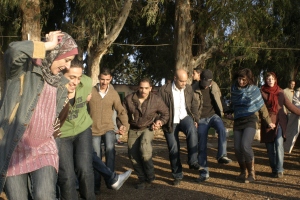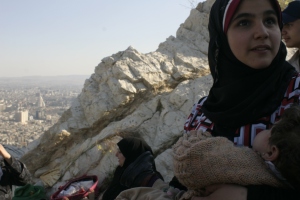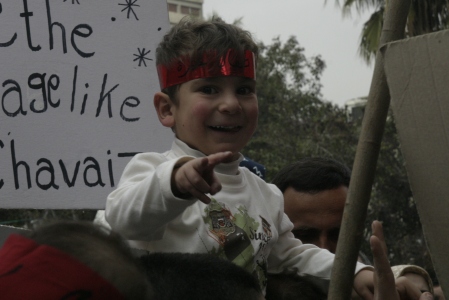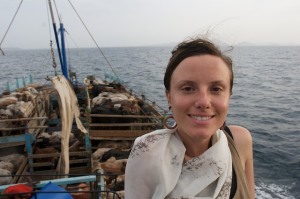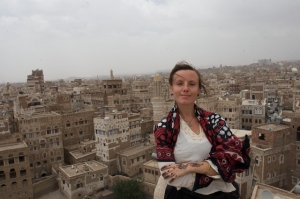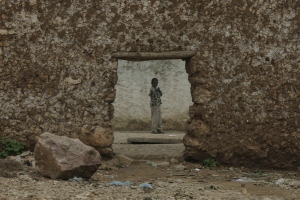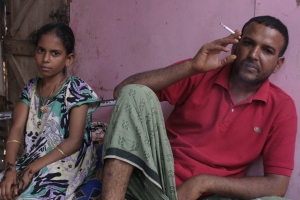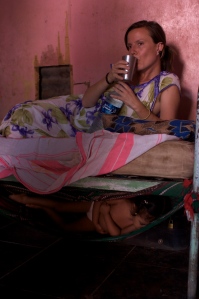Ramadan Kareem!

photo by sarah shourd
It’s a few minutes before 6 and the light in the port-city of Aden is beginning to fade. As the sun sinks behind bare, jagged cliffs the city takes a deep, full-bodied breath. Its mouth opens wide, its lips stretch thin and like a great, harmless beast it sucks all the people into its warm, concrete belly. In seconds the streets are empty. Steel-doors are bolted shut, soccer games cut short and kites quickly pulled from the sky. Women disappear into their homes and men duck into small, crowded restaurants.

photo by sarah shourd
No dark clouds mar the blue-grey sky, no sound of thunder threatens in the distance. The population of Aden is driven indoors by the sound of dozens upon dozens of loudspeakers. Mosques scattered across the city’s face erupt into a kind of song that is not song or chant, not beautiful or ugly but awesome and commanding. From my birds-eye perch, 3 or 4 hundred feet up on the backbone of Crater, the rim of an extinct volcano in which the city is literally built, the sound is deafening. It ricochets off the crater walls and collides in my inner-ear like a great, booming storm, “God is great, God is great. I bear witness that there is no god but Allah. I bear witness that Mohammad is Allah’s messenger.” It is the evening call to prayer.
As the setting sun cools the hot, wet air people are breaking their fast indoors before prayer. For the first time since before dawn they drink cool water and enjoy special Ramadan treats like breaded balls of soft potato, creamy pudding, crispy meat-filled samosas and soft, sugary dates. After a few minutes the voices start up again, “Hasten to prayer, hasten to prayer,” and people rise. Women clear the cups and plates from the rooms where they have eaten, then they lay out their mats for prayer. Men wipe the crumbs from their lips, rinse the grease from their hands and head for the mosque.

photo by sarah shourd
Ramadan is a month-long daylight fast observed everywhere where there are Muslims, which is pretty much everywhere. Islam is the fastest-growing religion on the planet, the population of the umma (Islamic community) reached between 1.6 and 1.8 billion last year. The world’s concentration of Muslims is in the Middle East and North Africa, where Muslims compromise an estimated 99%, and it is on the rise in Asia and Europe.

by sarah shourd
Ramadan is a time to get serious about your faith. It’s not only a time to abstain from food and drink but also to purify one’s thoughts, exercise restraint and practice good deeds. No one wants to get married during Ramadan because it means you can’t even think intimate thoughts about your loved one, let alone act on them. Everyone is encouraged to read the entire Koran and to be benevolent towards those less fortunate; the Koran specifies giving 5% of your income to the poor. Even days before the holiday begins it is common to hear people shouting “Ramadan!” at someone who does something distasteful. I saw a woman without a veil walk up to a man and say, “Don’t look at my face, Ramadan in coming!”
The first time I break the fast is on spacious, air-conditioned bus from Sana’a to Aden. As we traverse a rocky, green landscape be speckled with small homes and domestic animals the passengers begin to arrange their food on the small, plastic tables in front of them. When the sun is no longer visible behind low cliffs the bus becomes dead quiet and there’s tension in the air. No mosques are within hearing range so everyone must consult their Ramadan calendars for the exact time to break the fast. A dispute breaks out when a few men decide to start eating and others say it’s too early. The driver responds by turning on the radio and all doubt is assuaged when the call to prayer is heard crackling over the airwaves.
Everyone hands around a little of what they have, a disproportionate amount being heaped on us. Before we know it we have plastic cups of milk, half a dozen samosas, cookies and a mound of dates 4 inches deep. A man to our left with a very unique way of being friendly holds out a thick, juicy clump of dates and, when we start to refuse he turns his face away from us and keeps him arm extended in our direction.
The Real Story of the Shia
In a few minutes the bus is alive with chatter and shouts of, “Ramadan!” and “God is generous.” A middle-aged woman in front of us turns to my partner and asks him about the book he is reading. It is called, “The Shia Revival.” She wants to know why an American is reading about the Shia. Her assumption is that any book about Shia- a) whose author is not Shia and b) is being read by foreigner -must be full of lies.
“You have questions about Shia?” she asks, “I can tell you the real story of the Shia.” It turns out she’s an Iraqi engineer who moved to Yemen 7 years ago with her husband and two sons to escape Saddam and his brutal form of socialism. She and her husband are both professionals but it was impossible for them to make ends meet. She left behind the shell of a house she was slowly building on the banks of the Euphrates in the center of Baghdad. Little did she know that Iraq would soon become a place far more dangerous than they left it and that their dream home would be blocks away from the Green Zone, the center of the U.S. occupation.
She and her teenage son pour over the book and it isn’t long before they find what they are looking for. “Blood-thirsty, violent” her fingers trace the words on the bottom of the first page. “Why do they say this about the Shia?” she asked. He tries to explain to her that it was a quote and that the author, although not Shia himself, was sympathetic to Shia. She accepts this with a nod but her suspicion is not satisfied. We continue to chat for a while, chewing on dates and sipping tea, and before we arrive in Aden she turns around and invites us to her house for dinner that Friday to break the fast. “Come at 8 o’clock,” she says, “and please bring the book.”
City By the Sea
Every city I’ve ever been to feels different. Aden is built on a peninsula on the Southern coast of Yemen which juts out into the Indian Ocean. Connected to land by a narrow, finger-like isthmus, it was once one of the largest ports in the world. A bridge between Africa and Arabia, Port Aden remains crucial today, especially in the transport of oil from countries on the Arabian Peninsula. Aden is kind of like an Arab version of Coney Island: A city by the sea that never sleeps, awash with spectacle and surprise.
This works for us because in the Arab world there’s no chance of a normal sleep-schedule during Ramadan. In Aden people work until 4 or 5 in the morning and sleep until 2pm. All night long the streets are thick with day-laborers lined up for work, their tin-buckets full of tools and paint brushes. Men circle up and squat around platters of food or chew qat and play pool in the street. Women and children, many of them Somali refugees or black Yemenis, are shopping or begging. Old, half-naked men with brown skin covered in a thin, downy coat of white hair pose like cats on small squares of cardboard anywhere they can stake out a few unoccupied feet of sidewalk.

photo by sarah shourd
All over the Arab world people shorten the fast and make up for the lost hours of work during the day by staying up late. From what I’ve heard, Aden is already relatively nocturnal due to the heat, and now it has the most vibrant night-life (minus the alcohol, dance clubs and freak shows) that my short-term memory can recall. In Aden waiters serve shisha (in California we call it hookah) on the beach and you can smoke the sweet, apple-flavored tobacco till dawn. People eat chicken and rice in crowded restaurants where the waiters give you tissue paper and douse you with bottled perfume when you finish your meal. All afternoon children run up and down its rocky cliffs or stand on rooftops setting kites free to soar hundreds of feet into the sky.

photo by shane bauer
The next day I walk out into the slow, sumptuous heat at 2pm and find only a few, shirtless men in the streets. Not long ago South Yemen was its own country and it still feels that way today. From 1970 to 1990 there was a period socialism that left its mark on society. In Aden the legislation concerning women and minorities was decades ahead of neighboring countries and education was free, integrated and open to everyone. This progressive period ended during the unification of North and South Yemen in 1990. This was followed by a civil war in ’94, which the North won, and political and economic power has been concentrated in the capital city of Sana’a ever sense. In the last year rumblings of a separatist movement initiated by Ex-Generals has been gaining momentum.
The race and gender hierarchy remains less harsh in Aden than it is in the North. African immigrants occupy a lower economic position but are more integrated into society as a whole and there appears to be little consciousness of race among children or adult peers. Gender norms are also comparatively liberal; it is common to see women walking around without veils and some even wear colorful hijabs. Men flirt with me openly and are less likely to use my (male) partner as a go between when there’s something they want to say.

photo by sarah shourd
Nada’s Hospitality
Nada is on the phone explaining how to get to their apartment. They live outside of Crater in much more tame neighborhood where posters of president Saleh tower 15 feet high, the sidewalks aren’t crammed with people and the Chinese restaurant serves beer and vodka. There are 12 concrete apartment buildings stacked in a row and we stop to ask a kid which one is number 10. When we arrive at her door and meet her husband and two sons, Nada asks, “How did you find the apartment building?” “We asked a boy,” I reply. “Which boy?” She has a way of being blatantly suspicious of us and hospitable at the same time. “Just a boy,” I smile and hand her a plate of sweets we brought, offering peace.
Nada lived under Saddam Hussein’s police state for most of her adult life. Saddam openly despised Shia and they returned his sentiment. The way he was able to keep their anger at bay and prevent them from overthrowing him was by killing thousands and thousands of them who tried to resist. When Nada’s family returned to Iraq in 2005 to visit for the first time since the American occupation her youngest son, about 14, was seized by American soldiers during a raid. They were arresting every young Arab man unlucky enough to be in their path. In prison they held a gun to his head and threatened to kill him.
Somehow he got out alive but his family is still very protective of him. (Nada later confides in me that he yelled at her before we came over that night, “The Americans occupy our country and now you invite them to our house!”) He is the only one in the room who doesn’t speak English and is exceedingly jealous that his handsome older brother is getting more air-time. Nada pleads with me to try and speak Arabic with him and I somehow get out a few, hard-earned sentences. After a short while he warms up to us and starts clowning around, laughing at us because we don’t know who Michael Phelps is, the recent American Olympic Gold-Star Medalist. “You probably haven’t even seen his picture,” he shouts at us, “Tell me the truth, have you seen his picture?”
At some point during the meal it dawns on me that this is my first time sitting around a table with Iraqi people. Realizing this, I tell them that everyday I feel ashamed at what my country has done to their country. I say something about the protests I have helped organize, the books I have read and the t-shirts I have worn, wanting them to know that American people have expressed opposition. It all sounds so small and paltry in the presence of people that have lost so much. Even though I am proud of some of the anti-war work I’ve been a part of, I am ashamed sitting there that I haven’t done more.
As much as I thought about it, I never had the guts to stop paying taxes during the 5 years that we have occupied Iraq. That would be a statement. I tell her about the day we shut-down the Oakland Port in ’04 and stopped them from shipping out weapons for 24 precious hours. Feeling a little more positive after remembering that proud day, I talk about why we are moving to Syria. There are 2 million Iraqi refugees living in Damascus, surely there must be something that can be done to help them? At the very least I can help get their stories out. They accept my words with a nod, they understand how unsympathetic the U.S. government is to the opinions of its populace, they’ve heard it before. For a few moments we sit silently and an unspoken question weighs heavily in the room: Why did it have to happen like this? Why didn’t we do more to stop it? Why wasn’t there a strong, mass-based, long-term response to this war like there was against Vietnam, why wasn’t a movement reborn?
Why Don’t Americans Wear Make-Up?
The white, sandy beaches just outside of Aden are colonized by thousands of crabs. Transparent and swift, they weave and dance along the calm, blue coast. For the last few days we’ve been camping on the beach and now we cram ourselves into the back of a cab to travel 400 miles across the endless burnt, rocky expanse between the coast and the interior of East Yemen. Despite our close contact, the 7 friendly but serious types that we share the cab with don’t talk much for the next 6 hours.

photo by sarah shourd
We pass by grand turquoise-domed mosques in minuscule towns and several versions of road-side calligraphy that spell out “Allah” with rocks on mounds of dirt. As we glide through check-point after check-point I start to get a bit giddy from the excitement and nervousness of entering a more highly militarized territory. We enter a dead, rust-colored canyon and I finally get the guy next to me to crack a smile when I try and say, “I want to ride a bicycle” in Arabic but instead “I want to ride a chicken” comes out.
We’ve only been in Seyuun for about an hour and already people are gearing up to break the fast. We find a few empty seats outside of a restaurant full of dozens of men sitting behind long tables with identical plates set before them stacked with delicacies. This time there is no discussion, as soon as the voices start up everyone is eating. After the meal nearly all of the men leave to pray and we sit at our deserted table drinking small cups of strong, piping-hot tea.

photo by sarah shourd
There are so many times that I’ve laughed in wonder at how localized and specific cultural norms tend to be. In Seyuun when people drink tea they pour a little from the cup into the saucer and let it cool before they sip it straight off the plate. Makes sense, right? But no one would be caught dead doing it in Aden or Sana’a. My mouth dropped the first time I saw a woman and her daughter sitting side-saddle on the back of a motorcycle here, something no respectable Sana’ani woman would do. Actually the men in Seyuun sit-side-saddle too, apparently they think it’s kind of sleazy for men to wrap themselves around each other here, but everywhere else it’s completely natural.

photo by sarah shourd
The next day I’m woken by the sunrise prayer being called from a mosque right outside the window of our hotel. Not happy to be up before noon but curious enough to get out of bed and take a peak, I step onto the balcony and see dozens of men walking single-file towards the mosque. They have just finished their last meal of the night and after they pray most of them will go home and sleep through the morning.
That day we go to a town called Tarim that is located in a lush wadi (chasm between mountains once cut by a river) filled with date palms. There is a well-known religious school in the town and Muslims come from all-over Asia, Africa and America to study here. There was a shoot-out with the government here a few weeks ago, resulting in the death of an Al-Queda leader, one of few government anti-terrorist success stories in recent years. Around noon, when it gets too hot to stand in the shade-less streets, we sneak into a palm grove where we can sip cold energy drinks, talk politics and sample sun-warmed dates.

photo by sarah
We are 2 of maybe 5 foreigners in the town and everyone knows what hotel we are staying in. Later that day a man we met in a cafe calls the hotel to invite us to break the fast with him and his family. We only have a few minutes to get ready so I thrown my long, black abeya over stretch pants and a tank-top, wrap a scarf around my head and slip into my sandals. When we get to the house I am ushered into a room upstairs crowded with women and Shane vanishes down one of three flights of stairs branching off in different directions. The women are totally immersed in breaking the fast. They sit around platters of snacks in loose, colorful dresses, and motion for me to join them when I enter the room.
We exchange names and greetings and after a few minutes the plates are carried away and mats spread out for prayer. Someone motions for me to sit in the back of the room and I watch as each woman takes a large bundle of cloth out of her bag, puts it on over her head and emerges a dark, shapeless form. This garment, worn only for prayer, is even more modest than anything I’ve seen before. The only opening is a small round window at the top where their faces peek out.
I’m so grateful to finally see women pray. Five times a day men lay their mats out behind work counters, on busy sidewalks, alongside their vegetable carts and in the far corners of open markets. Men settle for any place they can find and pray without modesty. Even the doors to mosques are left gaping wide so that any passerby can see dozens of bent forms lined up inside.
Up until now I’ve never heard a woman say, “Allah Akbar,” (God is Great). Now I hear it repeated again and again, echoed in unison by the 15 women in the room. It is here, indoors, that women’s voices resound. Not over the loudspeakers of the mosque or on the radio or T.V. but in the privacy of their own homes. The prayer leader, her voice strong and purposeful, instructs them to bend, press their foreheads to the mats, then rise again to their feet. It’s something they’ve done 5 times a day, everyday of their lives since they were children and yet I can’t find anything equivalent in my life to compare it to. After a while people begin quietly reciting the Fatiha, a chapter of the Koran, individually and at their own pace, then they sit in silence.
The first woman who finishes takes off her robe and immediately gets to work. Peering into her small, hand-held compact she puts on face-powder, applies lipstick and thick eyeliner. She runs a brush through her hair and drapes a glimmering shawl around her shoulders. More women come into the room and each one greets every person in the room by exchanging a few brief words and smelling the back of her hand. My guess is that this has to do with perfume, which is extremely important in Yemeni culture, but I’ve heard nothing to confirm that. The younger ones wear silk and lace and are laden with gold: on their arms, around their necks and dangling from their ears. I later find out that the two fanciest young women are newlyweds and this dinner celebration is for them.
Now the real meal is brought in, platters heaped with rice and meat and little porcelain bowls filed with green and red spicy sauces they call “bisbas” or “pepper.” I am a lone, black-clad figure in this spectacular and elaborate display. A few of the younger women take interest in my appearance, they motion for me to take off my abeya and laugh when they see I only have on pants and a tank-top. One woman speaks English better than the rest and she takes mascara and powder out of her bag. “Americans no make-up?” she asks. I try and persuade her that many of us do wear make-up, accepting copious amounts myself, but in that instance, as in many others, I can’t find the right words to explain my culture.
I’ll Come Back to Yemen
This has been a difficult dispatch for me to finish because just days after we got back to Sana’a there was a terrorist attack on the American Embassy about a mile and a half from our house. I heard the blast when I was walking to the bus station and didn’t think much of it. An hour later I was interviewing a posh lawyer about the women’s movement when she got a phone call. Her friend told her to turn on the T.V. and it was then that we discovered what had happened.

photo by sarah
I don’t think terrorism has been this real to me since I woke up to another phone call on September 11th, 2001. That time it was my mom screaming over the answering machine, “They’re going to start a nuclear war!.” This event has given me much pause and a chance to reevaluate my own views. My first reaction was to blame the Bush administration for its ridiculously irrational strategy in the war on terror, but many Yemenis have challenged me, saying my analysis falls short. They say that I am too apologetic towards the terrorists, framing them as victims rather than the perpetrators of these ugly crimes and I think they are right, I have been guilty of that.
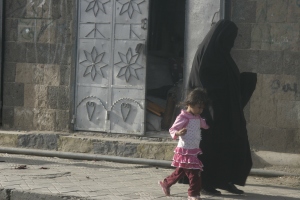
photo by sarah shourd
I think it is critical to understand that Yemenis themselves are the ones that suffer the most from these attacks. 16 people were killed, 14 of them Yemeni (6 of which were the attackers themselves). Yemen is an obscure place to most of the world and the actions of a few small, concentrated groups become emblematic of a whole population. A blow to the tourist industry is a blow to the economy and is followed by vicious cycle of poverty and government repression.
There is a lot of discontent breeding in Yemen, the majority of the people are poor and unhappy with their government but most don’t support extremism or view the loss of innocent life as a viable strategy to change anything. People say that local terrorist groups like Al-Queda are made up of uneducated youth that have no upward mobility and are easily manipulated and convinced to sacrifice their lives by highly-sophisticated groups with foreign funds to back them up. They want leverage to assert their religious and secular demands and, though Yemen is supposedly a democracy, feel that no other channels are open to them.
Yemen receives an average of 40 million a year from the U.S. to fight terrorism, someone I talked to that works at the American Embassy predicted that after these attacks that amount would probably triple. This problem has local origins, but there is no doubt that the U.S. is exacerbating the problem by throwing money at a corrupt authoritarian regime. Everyone in Sana’a says that the 30-odd people that have been rounded up and arrested after the attack were randomly selected as a show of force, largely to impress the U.S. and project an image of being hard on terror.
If the U.S. wants to fight terror in Yemen maybe it should support social services, fight corruption, find ways to bolster their economy and help them solve their food crisis. There is no way strengthening a government despised by its population is going to change anything.
Here’s an article I liked:
Violence a Symptom of Deeper Problems in Yemen










